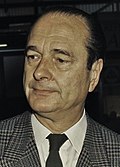1993 French legislative election
| |||||||||||||||||||||||||||||||||||||||||||||||||||||||||||||||||||||||||||
All 577 seats to the French National Assembly 289 seats were needed for a majority | |||||||||||||||||||||||||||||||||||||||||||||||||||||||||||||||||||||||||||
|---|---|---|---|---|---|---|---|---|---|---|---|---|---|---|---|---|---|---|---|---|---|---|---|---|---|---|---|---|---|---|---|---|---|---|---|---|---|---|---|---|---|---|---|---|---|---|---|---|---|---|---|---|---|---|---|---|---|---|---|---|---|---|---|---|---|---|---|---|---|---|---|---|---|---|---|
| Turnout | 68.93% ( 67.51% ( | ||||||||||||||||||||||||||||||||||||||||||||||||||||||||||||||||||||||||||
| |||||||||||||||||||||||||||||||||||||||||||||||||||||||||||||||||||||||||||
 Map showing the results of the second round. | |||||||||||||||||||||||||||||||||||||||||||||||||||||||||||||||||||||||||||
| |||||||||||||||||||||||||||||||||||||||||||||||||||||||||||||||||||||||||||
Legislative elections were held in France on 21 and 28 March 1993,[1] to elect the tenth National Assembly of the Fifth Republic.
Since 1988, President François Mitterrand and his Socialist cabinets had relied on a relative parliamentary majority. In an attempt to avoid having to work with the Communists, Prime Minister Michel Rocard tried to gain support from the UDF by appointing four UDF ministers. After the UDF withdrew its support for the government in 1991, Rocard and the UDF ministers resigned. The UDF then became allied with the Gaullist Rally for the Republic (RPR).
The Socialist Party (PS) was further weakened by scandals (involving illicit financing, contaminated blood and other affairs) and an intense rivalry between François Mitterrand's potential successors Lionel Jospin and Laurent Fabius. In March 1992 the Socialists were punished at the regional and cantonal elections and the following month Prime Minister Édith Cresson was replaced by Pierre Bérégovoy. The latter promised to fight against economic recession and corruption, but he was himself suspected to have received a loan from a controversial businessman, Roger-Patrice Pelat.
The election was a landslide victory for the RPR–UDF alliance, while the PS and their left-wing allies received their worst result since the 1960s. The PS lost nearly 80% of the seats they had held at the time of the chamber's dissolution. This caused a crisis within the PS; Fabius lost his position as First Secretary in favour of Rocard, who claimed that a political "big bang" was needed. Jospin announced his political retirement after he was defeated in his Haute-Garonne constituency. Depressed by the defeat and the accusations about the loan from Pelat, Bérégovoy committed suicide on 1 May.
Some traditional PS voters voted for the Greens in the first round. These ecologists obtained a total of 11%, making this the best total score for green parties in legislative elections. However, only two ecologists qualified for the runoff, including Dominique Voynet in her constituency in the Doubs département. Both of these candidates were eventually defeated. Lack of major political allies for these ecologists explained this failure to take any seats.
The RPR–UDF coalition (together with supportive right-wing parties) formed the largest parliamentary majority since 1958, taking a total of 484 of the 577 seats. The RPR leader Jacques Chirac demanded President Mitterrand's resignation and refused to be Prime Minister in a new "cohabitation" government. Finally, he suggested the nomination of his former RPR Finance Minister Edouard Balladur at the head of the government. Balladur promised publicly that he would not run against Chirac for the next presidential election. The second "cohabitation" finished with the 1995 presidential election.
Results
[edit] | ||||||||
|---|---|---|---|---|---|---|---|---|
| Party | First round | Second round | Total seats | |||||
| Votes | % | Seats | Votes | % | Seats | |||
| Rally for the Republic | 5,188,196 | 20.39 | 42 | 5,832,987 | 28.27 | 205 | 247 | |
| Union for French Democracy | 4,855,274 | 19.08 | 36 | 5,331,935 | 25.84 | 177 | 213 | |
| Socialist Party | 4,476,716 | 17.60 | 0 | 5,829,493 | 28.25 | 54 | 54 | |
| National Front | 3,159,477 | 12.42 | 0 | 1,168,150 | 5.66 | 0 | 0 | |
| French Communist Party | 2,336,254 | 9.18 | 0 | 951,213 | 4.61 | 23 | 23 | |
| Miscellaneous right | 1,199,887 | 4.72 | 2 | 736,372 | 3.57 | 22 | 24 | |
| The Greens | 1,022,749 | 4.02 | 0 | 20,088 | 0.10 | 0 | 0 | |
| Miscellaneous | 957,711 | 3.76 | 0 | 0 | ||||
| Ecology Generation | 921,925 | 3.62 | 0 | 17,403 | 0.08 | 0 | 0 | |
| Miscellaneous left | 457,193 | 1.80 | 0 | 448,187 | 2.17 | 10 | 10 | |
| Far-left | 451,804 | 1.78 | 0 | 22,509 | 0.11 | 0 | 0 | |
| Movement of Radicals of the Left | 228,758 | 0.90 | 0 | 237,622 | 1.15 | 6 | 6 | |
| Regionalists | 116,474 | 0.46 | 0 | 36,971 | 0.18 | 0 | 0 | |
| Far-right | 69,985 | 0.28 | 0 | 0 | ||||
| Total | 25,442,403 | 100.00 | 80 | 20,632,930 | 100.00 | 497 | 577 | |
| Valid votes | 25,442,403 | 94.72 | 20,632,930 | 90.49 | ||||
| Invalid/blank votes | 1,417,774 | 5.28 | 2,169,371 | 9.51 | ||||
| Total votes | 26,860,177 | 100.00 | 22,802,301 | 100.00 | ||||
| Registered voters/turnout | 38,968,660 | 68.93 | 33,773,804 | 67.51 | ||||
| Source: IPU, National Assembly | ||||||||
Parliamentary groups in the National Assembly
[edit]| Party | Seats | |||||
|---|---|---|---|---|---|---|
| Members | Caucusing | total | ||||
| RPR Group | 245 | 12 | 257 | |||
| UDF Group | 213 | 2 | 215 | |||
| Socialist Group | 52 | 5 | 57 | |||
| Republic and Liberty Group | 23 | 0 | 23 | |||
| Communist Group | 22 | 1 | 23 | |||
| Non-Inscrits | 2 | 0 | 2 | |||
| Total | 557 | 20 | 577 | |||
| Source: IPU | ||||||
See also
[edit]References
[edit]- ^ "Elections held in 1993". Inter-Parliamentary Union.





